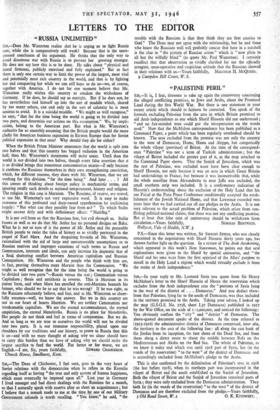LETTERS TO THE EDITOR
"RUSSIA UNLIMITED"
Sul,—Does Mr. Winterton realise that he is urging us to fight Russia now, while she is comparatively still weak? Because that is the unex- pressed conclusion of his argument. He thinks that the only way to avoid disastrous war with Russia is to prevent her growing stronger. He does not say how this is to be done. He talks about "physical and moral firmness, publicly exercised and fully explained." But in fact there is only one certain way to limit the power of the largest, most vital and potentially most rich country in the world, and that is by fighting her and conquering her while we can still hope to do so—we, of course, together with America. I do not for one moment believe that Mr. Winterton really wishes this country to emulate the wickedness of Germany. If he does' he should say so outright. But if he does not, he has nevertheless tied himself up into the sort of muddle which, shared by too many others, can end only in the sort of calamity he is most anxious to avoid. It is a suicidal muddle. "We might as well recognise," he says, "that for the time being the world is going to be divided into two parts, and determine our actions on this assumption." We, by impli- cation, belong to the American part. But what is Mr. Winterton's authority for so smoothly assuming that the British people would die more gladly for American business expansion in Eastern Europe than for Soviet political expansion in that area? Why should they die for either?
When the British Prime Minister announces that the world is split into two halves and that this country has begged inclusion in the American half, then Mr. Winterton's statements will make sense. Until then the world is not divided into two halves, though every false assertion that it is so divided brings that monstrous consummation nearer—if only because it confirms the Russians themselves in their own strengthening conviction, which, for different reasons, they share with Mr. Winterton, that we are working for this division. "for the time being." " And later . . . ? All this comes of thinking about foreign policy in mechanistic terms, and ignoring totally such details as national temperament, history and religion. The religion in this case is Marxism. The Russians, of course, are scared, to use Mr. Winterton's not very expressive word. It is easy to make nonsense of this profound and deep-rooted apprehension by exclaiming largely: "But what can they possibly fear from us? " To which Stalin might answer drily and with deflationary effect: "Nothing."
It is not evil from us that the Russians fear, but evil through us. Stalin knows as well as we do that Mr. Attlee has no personal designs on Baku. What he is not so sure of is the power of Mr. Attlee and the peaceable British people to resist the tides of history as so vividly portrayed in the gospel of Karl Marx. And the despairing hysteria of Mr. Winterton, rationalised with the aid of large and unwarrantable assumptions as to Russian motives and improper equations of such terms as Russia and Communism, interests and ideals, can only increase his dogmatic fear of .a final shattering conflict between American capitalism and Russian Communism. Mr. Winterton and the people who think with him are, in fact, proving themselves more Marxist than the Communists. "We might as well recognise that for the time being the world is going to be divided into two parts "—Russia versus the rest ; Communism versus Capitalism ; thesis and antithesis in reverse. This is Marxism in its purest form, and when Marx has enrolled the anti-Marxists beneath his banner, who should we be to say that he was wrong? If he was right, as the Russians reluctantly believe, and fear, and as Mr. Winterton so cheer- fully assumes—well, we know the answer. But we in this country are not in our heart of hearts Marxists. We are neither Communists nor irredeemable capitalists. We are the eternal accommodators, the eternal empiricists, the eternal Menshiviks. Russia is no place for Menshiviks. Her people do not think and feel in terms of compromise. But we do. And so long as we are true to ourselves the world will not be divided into two parts. It is our immense responsibility, placed upon our shoulders by our traditions and our history, to prove to Russia that this is so—and with no more thought of asking why we alone should have to carry this burden than we have of asking why we should make the largest sacrifice to feed the world. For better or for worse, we are English.—I am, Sir, yours faithfully, EDWARD CRANKSHAW. Church House, SIdlutrst, Kent.






























 Previous page
Previous page